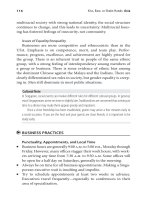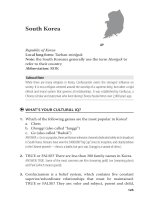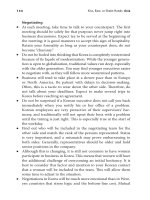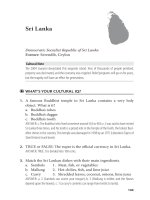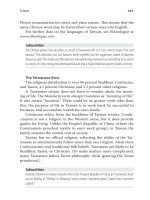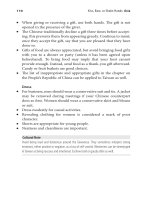Tài liệu How to Do Business in 12 Asian Countries 3 doc
Bạn đang xem bản rút gọn của tài liệu. Xem và tải ngay bản đầy đủ của tài liệu tại đây (318.77 KB, 9 trang )
All cultures have disadvantaged groups. is section identies
some sectors that have unequal status. ese can be dened by eco-
nomic status as well as by race or gender. Only the most industrial-
ized nations tend to have a large, stable middle class. Many countries
have a small, rich elite and a huge, poverty-stricken underclass.
Issues of male-female equality are also analyzed in this section.
It is useful for a female business executive to know how women are
regarded in a foreign country.
Never forget that this model represents cultural patterns that may
or may not apply to each individual you contact and get to know.
Utilize this information as a guideline and remain open to the new
experiences we all encounter abroad.
“Vérité en-deça des Pyrénées, erreur au-delà.”
—B P, –
“ere are truths on this side of the Pyrenees
which are falsehoods on the other.”
—: G H
Cultural Orientation xvii
xviii
China
PAGE 1
South Korea
PAGE 125
Japan
PAGE 56
India
PAGE 21
Thailand
PAGE 171
Mayaysia
PAGE 74
Singapore
PAGE 110
Indonesia
PAGE 35
Vietnam
PAGE 183
Sri Lanka
PAGE 143
Taiwan
PAGE 155
Philippines
PAGE 94
Hong Kong
PAGE 16
MAP OF ASIA
PAC IF IC OC EA N
Ba y o f Beng al
Arab i an S ea
I N DI AN O CE AN
So u th C hi na
Se a
Phi li pp in e
Se a
Mongolia
Pakistan
Tibet
Nepal
Burma
Bangladesh
Laos
Cambodia
1
China
People’s Republic of China
Local short form: Zhong Guo
Local long form: Zhonghua Renmin Gongheguo
Abbreviation: PRC
Cultural Note
The People’s Republic of China is well on its way to becoming the superpower of the twenty-
first century. Aside from having the world’s largest population and the world’s largest army,
it is a nuclear and space power. Now it is a global economic power as well. In February of
2005, the government of China lent the government of Russia U.S. $6 billion to help Moscow
nationalize the oil company Yukos.
●
3
WHAT’S YOUR CULTURAL IQ?
1. TRUE or FALSE? e Chinese are not interested in most interna-
tional sports.
ANSWER: FALSE. While many Chinese have limited experience playing sports, they are often
avid fans (and sports gamblers). When Shanghai-born Yao Ming joined the Houston Rockets
in 2002, Chinese interest in basketball soared overnight. And the Beijing Olympics has gener-
ated massive interest in Olympic sports.
2. Match the following Nobel Prize laureates with the appropriate
prize:
a. Tenzin Gyatso 1. Nobel in physics, 1957
b. Chen Ning Yang 2. Nobel for literature, 2000
c. Gao Xingjian 3. Nobel Peace Prize, 1989
ANSWERS: a. 3; b. 1; c. 2. Tenzin Gyatso is better known as the fourteenth Dalai Lama of Tibet.
Tibet, of course, has been occupied by the PRC since 1950. Gao Xingjian was the first Chinese
to win the Nobel for literature. There have been many Nobel Prizes awarded to Chinese in
2 Kiss, Bow, or Shake Hands: Asia
the sciences, although most of the recipients (like Chen Ning Yang) have done their most
important scientific work in the West.
3. ere are many places in Asia where the People’s Republic of
China nds itself in conict with other countries. Which of these
is not currently an international “hot spot?”
a. Macao
b. North Korea
c. e Spratly Islands
d. Taiwan
ANSWER: a. Portugal ceded its colony of Macao to the PRC at the end of 1999, and Macao has
been relatively peaceful since then. A traditional site for gambling, Macao is the only place on
the Chinese mainland where casinos are permitted.
●
3
TIPS ON DOING BUSINESS IN CHINA
●
Experienced travelers avow that patience is the most important
skill needed to do business in China. e Chinese are very good
at guring out when a foreigner is under pressure from a tight
deadline, and they turn that to their advantage in negotiations.
●
Although the economic boom is changing things, China is still a
hierarchical society. Age is respected. When you send more than
one representative to China, the oldest person should receive
deference from the younger ones. e elder representative should
even enter and leave the conference room rst.
●
While the Chinese have made great strides in using the Inter-
net, they face serious obstacles. For one thing, the thousands of
ideographs in Chinese language are not easily adapted to use on
a computer keyboard. Also, Internet use in China is hampered by
the government, which censors Web sites and periodically shuts
down Internet cafés.
●
If possible, avoid traveling to China during the lunar New Year.
Also called Spring Festival, this is China’s most important, nation-
wide weeklong holiday. Tradition demands that every Chinese
return to his or her traditional home during the lunar New Year.
With so many migrants to the cities, this means that there are
millions of trips taken by car, bus, train, or airplane during the
festival.
Cultural Note
The lunar New Year puts enormous strains on China’s transportation infrastructure. Many
people wait for days just to secure standing room on a train or bus. To alleviate this, the
Chinese government is considering mandating staggered vacations, in the hope that travel
will be eased if not everyone is off work at the same time. This may ease travel during China’s
other national holidays, but it is doubtful whether it will eliminate the Spring Festival tradition
of returning to one’s ancestral home.
●
3
COUNTRY BACKGROUND
Demographics
China has 1.3 billion inhabitants (2006 estimate), making it the
most populous country in the world. One quarter of the earth’s
population lives there. Although there are many minority groups,
over 91 percent of the population is ethnic (Han) Chinese. China has
implemented a rigorous birth control program that limits couples to
only one child.
History
e Chinese boast the world’s oldest continuous civilization,
with more than 4,000 years of recorded history. Beijing (old Peking)
has been the capital of China for over 800 years and is the country’s
political, economic, and cultural hub.
China was ruled by strong dynasties for thousands of years. e
rst recorded dynasty, the Hsia, existed around 2200 .., and the last
dynasty, the Ch’ing, ended in 1911. Some of the most important cul-
tural achievements in history were produced during this time, such as
papermaking, the compass, gunpowder, and movable-type printing.
Aer the fall of the last dynasty, Sun Yat-sen founded the Republic
of China and was succeeded by Chiang Kai-shek in 1927.
Mao Tse-tung’s Communist forces took control in 1949 and estab-
lished the Communist government that still exists, although events—
China 3
4 Kiss, Bow, or Shake Hands: Asia
from the massacre in Tiananmen Square in June of 1989 on—have
shown an increasingly popular demand for democratic reform.
China has been divided into twenty-two provinces, ve autono-
mous regions, and three municipalities.
Type of Government
e People’s Republic of China has a Communist government.
ere is a single legislative house, the National People’s Congress;
all members belong to the Communist Party. e National People’s
Congress elects the Standing Committee, which holds executive
power and is made up of the premier and leading ministers. e pre-
mier is the head of the government; the president is the chief of state.
e position of secretary general of the Central Committee of the
Chinese Communist Party is also an oce of great power; it is oen
held by the current president.
e Communist regime is highly centralized and authoritarian,
and controls many aspects of life in China.
Current government data can be found at the Embassy of China
at www.china-embassy.org.
Cultural Note
The revolutionary government of the People’s Republic of China made changes to the Chinese
language. Many complex symbols in written Chinese were simplified. And the direction of
written Chinese was changed: instead of being written in vertical columns, it is now primarily
written like most Western tongues, from left to right in horizontal rows.
This reformed Chinese has not been universally accepted by the Chinese outside the PRC.
Some Taiwanese refuse to reform Chinese, preferring the pre-revolutionary forms. When you
go to the PRC, make sure your translators use reformed Chinese.
Language
e ocial national language is standard Chinese, based on the
Mandarin dialect. It is spoken by more than 70 percent of the popu-
lation. Many Chinese speak Cantonese, Shanghainese, and Kejia dia-
lects. Ethnologue, at www.ethnologue.com, recognizes 202 languages.
Each minority speaks its own dialect or language. English is spoken
by many businesspeople.
Although spoken Chinese has many dialects (some of which are
as dierent as English is from German) there is one common written
language. is is why many Chinese movies include Chinese sub-
titles, so that Cantonese-speaking Chinese audiences can understand
the Mandarin-speaking actors, or vice versa.
e government of the PRC has begun investing in Chinese lan-
guage training for foreigners. Contributions to support Chinese lan-
guage programs are being made to major trade partners worldwide.
Cultural Note
Of all its trading partners, China’s relationship with Japan is one of its most contradictory. The
government of the PRC is always ready to criticize Japan for any real or imagined offense, from
Japan’s cozy relationship with Taiwan to Japan’s failure to be properly abashed for its military
actions in China before and during the Second World War. Yet, in 2004, China surpassed the
USA as Japan’s largest trading partner. Their trade continues, despite such real conflicts as
both countries claiming the same offshore oil fields, or a Chinese submarine being detected in
Japanese waters in November of 2004.
The Chinese View
Despite the fact that the government encourages atheism, the
Chinese Constitution guarantees religious freedom (within certain
constraints). Buddhism, Islam, and Christianity are the three major
formal religions practiced in China. However, even larger numbers
of Chinese believe in traditional Chinese philosophies, notably Con-
fucianism and Taoism.
Confucianism, although not a religion with a divine deity, has
great inuence on Chinese society. Confucius was a Chinese scholar
and statesman who lived during feudal times over 2,000 years ago.
He established a rigid ethical and moral system that governs all
relationships.
Confucius taught that the basic unit of society is the family. In order
to preserve harmony in the home, certain reciprocal responsibilities
China 5
6 Kiss, Bow, or Shake Hands: Asia
must be preserved in relationships. ese relationships are between
ruler and subjects, between husband and wife, between father and
son, between elder brother and younger brother, and between friends.
Since all but the last are hierarchal, rank and age have historically
been very important in all interactions. All actions of the individual
reect upon the family, and lial devotion is of utmost importance.
e virtues of kindness, propriety, righteousness, intelligence, and
faithfulness have also been deeply revered.
■
*
Know Before You Go
Most foreign businesspeople in China’s major cities will find an environment comparable
to that of any city in the industrially developed world. The greatest hazards are from traf-
fic and environmental pollution.
China’s less-developed areas present greater challenges. The transportation infra-
structure is overloaded, and some foreign goods (including medicines) may not be
readily available.
China is thought to be the source for many forms of influenza that eventually infect
people all over the world. It is theorized that this happens not just because of China’s
unsurpassed population density, but because of Chinese farming techniques, which
allow animals of different species to come into close contact. This is believed to facilitate
viral transfer between species, eventually resulting in a virus which infects humans. Cer-
tainly, anyone who has visited an outdoor Chinese market will see different species of live
animals on sale. The Chinese government recently prohibited such markets from selling
civet cats, which were suspected to be the source of the SARS virus.
China is a huge nation, subject to all manner of natural hazards. Earthquakes have
caused widespread deaths in the past, but China also suffers from typhoons and other
dangerous storms, floods, and mudslides.
Cultural Note
Rural areas in China may have limited accommodations, as well as dangers not usually
associated with industrialized nations. For example, schistosomiasis (snail fever) has recently
been reported in lakes in Hunan province. A debilitating disease—deadly if not treated—it
is caused by a waterborne parasite and can infect humans who come into contact with tainted
water for as little as ten seconds. Estimates of the number of people infected run as high as
900,000. Sadly, schistosomiasis was nearly eradicated in China in the 1950s. The return of the
disease reflects China’s neglect of the countryside in favor of its flourishing cities.
●
3
CULTURAL ORIENTATION
Cognitive Styles: How the Chinese Organize
and Process Information
e Chinese are generally circumspect toward outside sources of
information. ey usually process data through a subjective perspec-
tive, derived from experience—unless they have been educated at a
Western university. Universalistic behavior that follows the Commu-
nist Party line is still required under the Communist government.
e favoritism shown to members of the Communist Party is overtly
particularistic.
Negotiation Strategies: What the Chinese Accept as Evidence
In general, truth is subjective, and one’s feelings, along with a
modied belief in the Communist Party line, are primary sources of
the truth. Facts are accepted by younger Chinese, particularly within
the burgeoning entrepreneurial sector. However, they still strongly
consider the other two sources, and will not usually accept a proposal
if it is in conict with their personal feelings for the prospect.
Value Systems: The Basis for Behavior
China is still primarily a collectivistic culture dominated by the
Communist Party. e following three sections identify the Value
Systems in the predominant culture—their methods of dividing right
from wrong, good from evil, and so forth.
Locus of Decision-Making
In a centrally controlled economy, responsibility rests with gov-
ernment planners, but individuals are held responsible for their
decisions within the system. Local decisions are made by the head
of the collective, and members must behave accordingly. Collectives
are insular, closed entities in which individual goals are subordinated
to those of the collective. In the zones of free enterprise, businesses
are experimenting with freedom from party rule but not from the
collectivist way of thinking.
China 7



